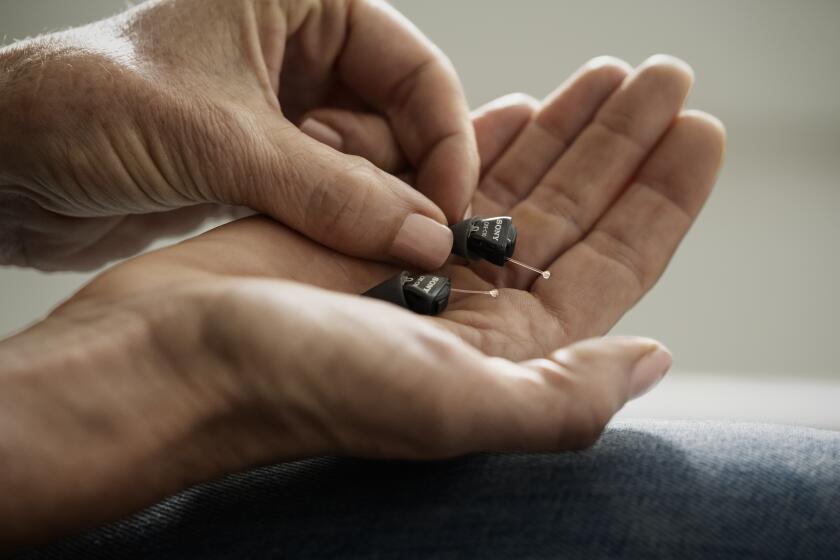Painting a Bleak Picture for Teen Girls : Health: Experts say an entire generation of young women is courting disease and other medical problems because of risky habits such as smoking, unprotected sex and drug use.
While research into, and knowledge about, women’s health is rapidly expanding, the health future of the nation’s younger women has never looked more bleak, experts noted at a conference here last week.
Long strides have been taken toward understanding diseases that mostly affect females, such as breast cancer, and those long ignored in women, such as heart disease.
“But our work is centered around a great and tragic irony: We have great difficulty managing our own destructive behavior,” says Lodewijk J.R. de Vink, chairman of Warner-Lambert, the giant pharmaceutical company and conference sponsor. “We must take a stand on the pain we inflict upon ourselves.”
Nowhere is this more true, say health experts, than among adolescent women, who engage in far riskier health behaviors--and in greater numbers--than any generation of women.
High rates of substance abuse, smoking, pregnancy, sexually transmitted diseases, eating disorders and depression paint an appalling health portrait for young women, says Suzanne Bliss, chairwoman of the National Health Council’s forum, Health for Women in the 21st Century.
Moreover, young women often have no health insurance (about one in six teens is not covered by health insurance) and rarely seek medical care. A growing number are homeless or single parents living in poverty. And they are bombarded with messages from the media that emphasize physical perfection.
All this while the problems young women have always faced, such as childhood physical or sexual abuse, continue.
Without addressing the problems facing teens, Bliss says, “there is hope that women’s health will be better in the future, but certainly there are no guarantees.”
Experts lament that many choices adolescents make may have a lifelong health impact. Lung cancer has become the leading cancer killer among women because of higher rates of smoking among women in recent decades. That trend shows no sign of abating among adolescents. One in five female high school seniors smokes daily, reports Girls Inc., a private organization formerly known as Girls Clubs of America.
Other addictions, which often begin in adolescent years, threaten young women’s health. In another recent survey, one in four girls age 12 to 17 reported using alcohol in the previous 30 days.
Sexually transmitted diseases and pregnancy can also have long-lasting consequences, and rates for both continue to increase among teen-agers. Half of all high school senior girls say they have had sex, and more than 3 million teens--male and female--contract an STD each year. One million teen-agers become pregnant each year.
“Teen pregnancy alone puts a young woman at risk for anemia, toxemia and the later risk of cervical cancer,” says LaWanda Ravoira, a health educator in Florida.
Surveys show more than half of all teen-age girls believe they are fat, and 20% report they use diet pills to lose weight. Dieting may not only strain the heart, it also can rob adolescents of nutrients important in building strong bones.
Despite the obsession with thinness, however, half of all teen-age girls don’t get enough exercise to prevent heart disease, according to Girls Inc. studies.
*
But perhaps most distressing, experts say, is low self-esteem and widespread depression among young women. While causes are unclear, some experts say they reflect “how prejudice, stereotyping and society’s low expectations have held girls back,” Girls Inc. reports. This is especially true among poor and minority teens, experts say.
Authors of an American Hospital Assn. report say physical and emotional dangers faced by youths today are not so much medical as economic, social and cultural.
For example, says Ravoira, some girls become pregnant intentionally, wanting to add value to their lives: “Too often these young women look to relieve their pain in extremely self-destructive ways. They tell me they have sex because they are looking for love and attention. Society has not shown these girls that there is a reason to avoid a pregnancy.”
Without addressing underlying causes of loneliness and low self-worth, she says, “this pain may follow these women into their adult lives.”
The good news is that more attention is being focused on teaching healthy behaviors and disease prevention to young women.
A major part of the solution may lie outside traditional medicine, experts note. While specialties in women’s and adolescent health will eventually serve young women well, it is more practical to look at using trained peer counselors, outreach workers, school nurses and adult mentor programs, such as Big Sister programs, to reach teens, says NHC’s Bliss.
Adds Lorraine Williams Greene of the Meharry Medical School in Nashville: “We have to examine their environment, including health care delivery systems. We know they are underserved and that there are too few school-based health clinics.”
A teen outreach program at Meharry--”I Have a Future”--focuses on preventing teen pregnancy, STDs and victimization by using trained peer counselors and medical students, she says. It operates from public housing projects and seeks input from families about how to best address adolescent girls’ needs.
Moreover, it includes men in the discussion.
Says Greene: “We must work with females and males if we are to address some of the health problems facing young women.”
*
Other solutions to the adolescent health crisis range from changing what teens are taught to changing how adult women model themselves to their daughters.
Adolescents deserve a more frank and thoughtful discussion of sex in homes and schools, says Pamela J. Maraldo, newly elected president of Planned Parenthood Federation of America:
“We have one of the highest rates of teen pregnancy and STDs among Western nations because we don’t have a very realistic attitude toward sex as a part of human development.”
But information alone isn’t enough, cautions Dr. Susan Blumenthal of the National Institute of Mental Health. Research must focus on ways to help teen-agers change their behaviors, such as resisting peer pressure to do something they know is unhealthy.
“We know that information alone hasn’t led many young people into using birth control or practicing safe sex,” she says.
Health education for young women should also address how they view themselves, experts say. Adolescents should be exposed to alternative ways of viewing the glamorous, cigarette-smoking, ultra-thin models they see in glossy magazines.
“The issue is that we have to help them look critically at what they are seeing and hearing,” Greene says.
But that vision includes what young women see their mothers, aunts, teachers and other role models doing. Adult women need to change their own risky health behaviors for the daughters’ sake, if not their own, experts say.
And, men and women of all generations can contribute to young women’s health by embracing their talents and promoting their worth.
Says Planned Parenthood’s Maraldo: “In society we have a long way to go in considering women as fully equal citizens who can make their own decisions in their lives--and in telling our little girls that message.”



